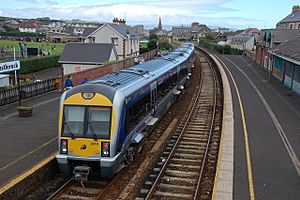Belfast–Derry line facts for kids
Quick facts for kids Belfast–Derry Line |
|
|---|---|

NI Railways Class 3000 at Castlerock.
|
|
| Overview | |
| Status | Operational |
| Owner | Translink |
| Locale | Northern Ireland |
| Termini | Belfast Great Victoria Street Londonderry / Coleraine |
| Stations | 15 |
| Service | |
| Type |
|
| System | NI Railways |
| Services | Belfast-Derry Belfast-Coleraine (continues to Portrush) Derry-Portadown (once daily) |
| Route number | NIR Service 5/6 |
| Operator(s) | NI Railways |
| Rolling stock |
|
| Ridership | 3 million a year |
| Technical | |
| Number of tracks | Double track from Belfast to Monkstown Single line with Passing loops from Monkstown to Londonderry |
| Track gauge | 1,600 mm (5 ft 3 in) Irish gauge |
| Operating speed | 90 mph (140 km/h) |
The Belfast–Derry railway line connects the cities of Belfast and Derry in Northern Ireland. It's also called the Derry~Londonderry Line by NI Railways. For most of its journey, it's a single track. This means trains use special "passing points" to let other trains go by.
Contents
How Often Do Trains Run?
Weekday and Saturday Services
On weekdays and Saturdays, trains usually run every hour. They travel between Great Victoria Street in Belfast and Londonderry. There are also shuttle trains that connect Portrush with the main line at Coleraine.
Sunday Services
On Sundays, trains from Belfast to Derry run every two hours. If a train isn't leaving directly from Derry, the shuttle service from Portrush will continue all the way to Belfast. This means passengers at Derry, Bellarena, and Castlerock might wait longer.
Past Journeys
Before 2001, trains took a different route. They went through places like Crumlin and Lisburn. When the Bleach Green viaduct reopened, journeys between Belfast and Derry became much shorter. The old route is now mostly used for training new train drivers.
Upgrading the Line
Recent Improvements
In 2011, there were plans to reduce train services. This was to allow for important safety work on the line. At first, there wasn't enough money for the £75 million upgrade. People worried the line might close forever.
But in October 2011, a minister found money for the project. The upgrade started in July 2012 and happened in three stages.
Phase 1: New Tracks
The first stage meant closing parts of the line for nine months. Workers completely replaced sections of the track. They used a modern method called continuous welded rail. This makes the track stronger and last longer. This phase finished in March 2013. For the first time in decades, a morning train reached Derry before 9:00 am!
Phase 2: Better Signalling
In the second stage, some old passing loops were removed. New ones were built in different places, like at Bellarena. New signalling systems were put in place. This made the line safer and more efficient. An hourly train service between Belfast and Derry started on July 3, 2017.
Phase 3: Future Plans
The third stage will involve more track upgrades. It aims to allow trains to travel at 90 mph (140 km/h) between Castlerock and Derry. However, funding for this part of the project is still uncertain.
Other future ideas include adding a second track in some areas. This would allow more trains to run at the same time. In October 2019, the Derry train station moved to a new, updated building.
Cool Engineering on the Line
At Coleraine, there's a special bascule bridge that the railway crosses. This bridge can lift up to let boats pass on the River Bann.
Near Castlerock station, there are two tunnels. They were built a long time ago in 1845. The Castlerock tunnel is the longest railway tunnel in Northern Ireland. It's about 668 yards long! After a short open section, trains go through the shorter Downhill tunnel, which is 301 yards long.
How Trains Are Controlled
The train signals from Belfast to Ballymena are controlled from a main center in Belfast. Further along the line, signals and level crossings are controlled from the Coleraine signal cabin. After a big upgrade in 2016, the whole line uses modern colour light signals. This means the old signal boxes at Castlerock and Waterside are now closed.
What Trains Use This Line?
The Belfast–Derry line uses modern diesel trains. These are the NIR Class 3000 and NIR Class 4000 models. They are sometimes called C3K and C4K trains.
Images for kids
-
NI Railways Class 3000 at Castlerock.
 | Claudette Colvin |
 | Myrlie Evers-Williams |
 | Alberta Odell Jones |


